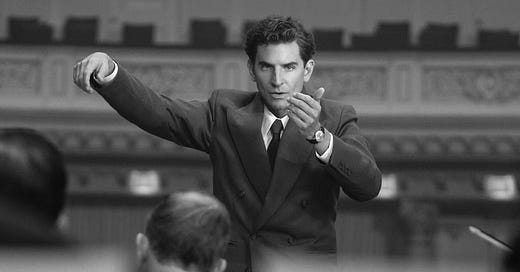"Maestro" Disrespects the Man It Claims to Honor
The film favors Bradley Cooper's image over Leonard Bernstein's story
A biopic always seems doomed to fail if the ambition of the lead actor is the backbone of the project. Think of Austin Butler in Elvis or Rami Malek in Bohemian Rhapsody — two actors who were praised for the intensity of their transformations but ultimately delivered something uncanny and caricaturish. Their respective films were designed to be spectacles that permanently redirect the cultural legacy of a beloved figure; reinventing the public perception of a real person to center a star-studded biopic.
In Maestro, Bradley Cooper injects himself into the canon of Leonard Bernstein’s history but he fails to include any genuine introspection or even information about Bernstein himself beyond the fact that he was a gay composer. The unfortunate but unsurprising result is an immaterial and disappointing vanity project for Cooper that uses the real Berstein’s art as a background score for formless emotional turmoil of the disembodied life that Maestro traces.
Maestro is reverse-engineered from Cooper’s unsubstantiated genius. Rather than visualizing Bernstein through his renowned artistic oeuvre, or centering his revered compositions as a way into his psyche, Cooper embodies Bernstein with a wooden carelessness that demonstrates an interest in upstaging Bernstein’s achievements. Maestro tries to convince us that the only thing more impressive than the unobstructed catharsis of Bernstein’s conducting is how deftly Bradley Cooper imitates them.
Though Maestro’s intent is convincing the audience of Cooper’s genius, the film is also conscious of how painfully distant it is from its subject. In a flimsy attempt to combat this separation, the film oscillates between shallow character introspection and inarticulate attempts to understand Cooper’s shallow interpretation of Bernstein through the gaze of his wife Felicia (Carey Mulligan); a failed attempt at providing some semblance of emotional potency.
In these attempted emotional meditations, Maestro demonstrates its greatest and most frustrating disappointment. The film recognizes that there is an unrestrained physicality to Bernstein’s conducting and composition that occupies his whole mind and body when at the podium, and examining the tensions of his personal and professional desires through the lens of this physicality might provide the basis for an illuminating film. But Cooper does not care to venture beneath the veneer of his pristine cinematics in an investigation of the messy and ugly sides of passion and ambition, and therefore never actually expands the basic public portrait of Bernstein.
In service of Cooper’s ego and aesthetic vision, the film necessarily blurs and consolidates the image of Bernstein (by all accounts an actual artistic genius). Maestro becomes a grotesque portrait, calling back to cinematic techniques from a bygone era while stripping them of their substance, amplifying the vacuousness of Cooper's caricature. The legacy of an actual maestro is contorted into a canvas for Cooper to abuse, eliminating revelation in favor of manufactured adoration.
OVERALL SCORE: 2/10
Maestro was released on December 20, 2023 and is currently streaming on Netflix.





You know, it’s not until I conducted it that I became convinced that we are all capable of murder . . . .
it’s my score!